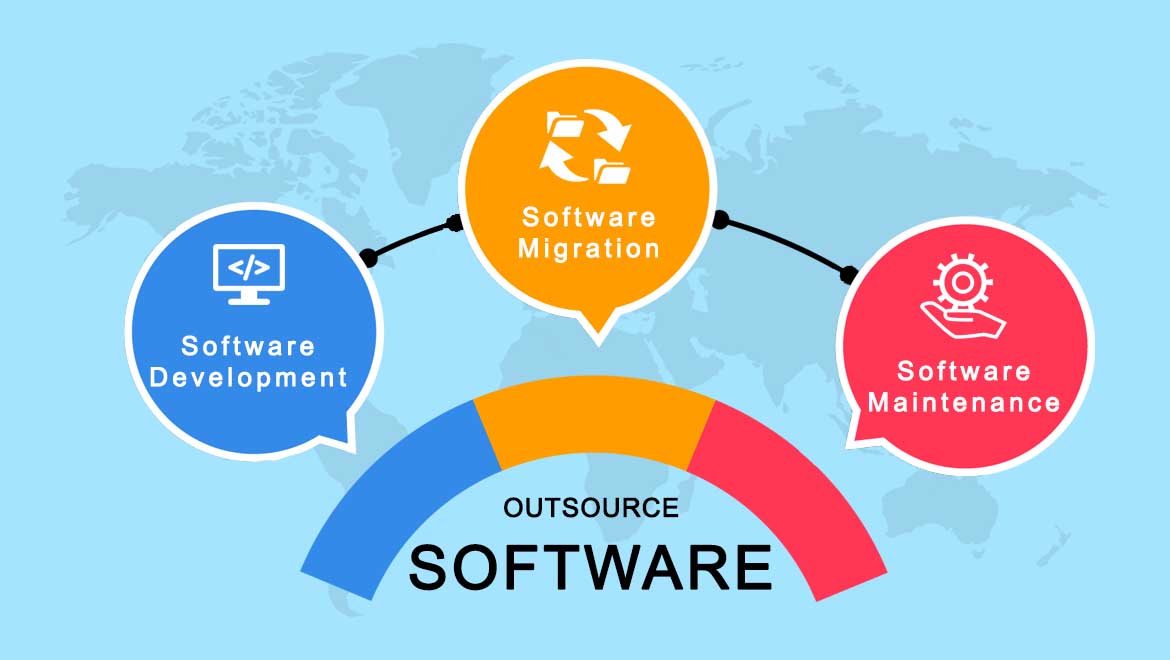Outsourced software development service opens up a world of possibilities, allowing companies to tap into specialized skills and enhance cost-effectiveness. Let’s delve into the realm of outsourcing and explore its benefits and challenges.
In the following sections, we will discuss key factors to consider when choosing a service provider, challenges that may arise, best practices for project management, and much more.
Importance of Outsourced Software Development Services
Outsourcing software development has become a popular choice for businesses looking to streamline their operations and stay competitive in the market. There are several key benefits to outsourcing software development that contribute to its importance in today’s business landscape.
Cost-Effectiveness and Efficiency
Outsourcing software development can significantly reduce costs for companies by eliminating the need to hire and train in-house developers. This cost savings can then be reinvested into other areas of the business to drive growth and innovation. Additionally, outsourcing allows for faster development cycles, as teams can work around the clock in different time zones, leading to quicker project completion and time-to-market.
Access to Specialized Skills
One of the most significant advantages of outsourcing software development is the ability to access specialized skills not available in-house. By partnering with external development teams, companies can tap into a diverse talent pool with expertise in various technologies and industries. This ensures that projects are completed with the highest level of quality and innovation.
Successful Examples
Many successful companies have leveraged outsourced software development to achieve their business goals. For example, WhatsApp, now owned by Facebook, outsourced the development of its initial version to a team in Russia. This decision allowed WhatsApp to focus on its core competencies while benefiting from the expertise of skilled developers.
Conclusion
Overall, outsourcing software development services can provide companies with a competitive edge by offering cost-effective solutions, access to specialized skills, and increased efficiency in project delivery. It is a strategic approach that continues to drive success for businesses across various industries.
Factors to Consider When Choosing an Outsourced Software Development Service

When selecting an outsourced software development service, there are key factors that need to be evaluated to ensure a successful partnership. From cultural fit to pricing models, each aspect plays a crucial role in determining the right service provider for your project.
Importance of Cultural Fit and Communication
Effective communication and cultural fit are essential for a smooth outsourcing relationship. Misunderstandings due to language barriers or differences in work culture can lead to project delays and quality issues. It is important to choose a service provider whose values align with your own and who can communicate effectively throughout the project.
Pricing Models in Outsourced Software Development
There are various pricing models commonly used in outsourced software development, such as fixed price, time and materials, and dedicated team. Each model has its own advantages and disadvantages, and it is important to choose one that aligns with your project requirements and budget constraints.
Significance of Quality Assurance and Project Management Processes
Quality assurance and project management processes are crucial for ensuring the success of outsourced software development projects. A reliable service provider should have robust QA processes in place to detect and fix any issues before deployment. Additionally, effective project management ensures that the project is delivered on time and within budget.
Challenges in Outsourced Software Development

Outsourcing software development can bring numerous benefits, but it also comes with its fair share of challenges that need to be addressed for successful collaboration. Here are some common challenges faced when engaging with outsourced service providers:
Overcoming Language and Time Zone Differences
- Establish clear communication channels: Utilize tools like video conferencing, messaging platforms, and project management software to ensure effective communication.
- Provide detailed project documentation: Clearly Artikel project requirements, specifications, and expectations to minimize misunderstandings due to language barriers.
- Adapt working hours: Find overlapping work hours to schedule meetings and collaborative work sessions to bridge the gap caused by different time zones.
Potential Risks Associated with Outsourcing
- Quality concerns: Ensure that the outsourced team has the necessary expertise and experience to deliver high-quality results.
- Dependency on external vendors: Mitigate the risk of being overly reliant on outsourced partners by maintaining in-house expertise and oversight.
- Data privacy and security: Implement strict data security measures, including non-disclosure agreements and encryption protocols, to protect sensitive information.
Ensuring Data Security and Confidentiality
- Choose reputable vendors: Conduct thorough background checks and due diligence to ensure that the outsourced service provider has a good track record of handling sensitive data.
- Implement data protection policies: Clearly define data security protocols, access controls, and confidentiality agreements to safeguard your organization’s information.
- Regular audits and monitoring: Continuously assess and monitor the security practices of the outsourced team to identify and address any vulnerabilities or risks proactively.
Best Practices for Managing Outsourced Software Development Projects: Outsourced Software Development Service

When it comes to managing outsourced software development projects, there are several best practices that can help ensure success. From defining clear project requirements to leveraging communication tools, these practices play a crucial role in the overall outcome of the project.
Importance of a Well-Defined Scope of Work and Project Requirements
Having a well-defined scope of work and project requirements is essential for managing outsourced software development projects. This ensures that both the client and the development team have a clear understanding of the project goals, timeline, and deliverables. Without a solid scope of work, projects can easily veer off track, leading to delays and miscommunications.
Tips for Effective Communication and Collaboration with Remote Teams
- Establish regular communication channels through video calls, emails, and instant messaging platforms.
- Provide detailed project documentation and updates to keep all team members informed.
- Cultural awareness and sensitivity are crucial when working with remote teams from different backgrounds.
- Encourage open and transparent communication to address any issues or concerns promptly.
Role of Project Managers in Overseeing Outsourced Development Projects
- Project managers play a critical role in overseeing outsourced development projects by ensuring that project requirements are met, deadlines are adhered to, and communication flows smoothly.
- They act as a bridge between the client and the development team, facilitating collaboration and addressing any challenges or roadblocks that may arise.
- Project managers also monitor project progress, allocate resources effectively, and mitigate risks to ensure project success.
Examples of Tools and Technologies for Project Management in Outsourcing, Outsourced software development service
- Project management platforms like Jira, Trello, and Asana help track tasks, milestones, and deadlines.
- Collaboration tools such as Slack, Microsoft Teams, and Zoom facilitate real-time communication and file sharing.
- Version control systems like Git ensure code integrity and enable seamless collaboration among team members.
- Time tracking software like Harvest or Toggl help monitor team productivity and allocate resources efficiently.
Conclusion
In conclusion, outsourced software development service offers a strategic approach to enhancing operations and accessing top-notch expertise. By navigating the nuances of outsourcing, companies can unlock a wealth of opportunities while mitigating risks effectively.
Essential Questionnaire
How can outsourcing software development benefit companies?
Outsourcing software development can provide access to specialized skills, enhance cost-effectiveness, and improve efficiency.
What are some common challenges in outsourced software development?
Common challenges include language barriers, time zone differences, and potential risks related to data security and confidentiality.
Why is cultural fit important when choosing an outsourced service provider?
Cultural fit is crucial for effective communication and collaboration, ensuring smooth interactions between the client and the service provider.
